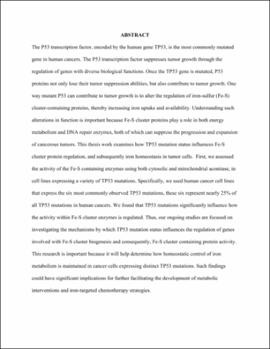| dc.description.abstract | The P53 transcription factor, encoded by the human gene TP53, is the most commonly mutated gene in human cancers. The P53 transcription factor suppresses tumor growth through the regulation of genes with diverse biological functions. Once the TP53 gene is mutated, P53 proteins not only lose their tumor suppression abilities, but also contribute to tumor growth. One way mutant P53 can contribute to tumor growth is to alter the regulation of iron-sulfur (Fe-S) cluster-containing proteins, thereby increasing iron uptake and availability. Understanding such alterations in function is important because Fe-S cluster proteins play a role in both energy metabolism and DNA repair enzymes, both of which can suppress the progression and expansion of cancerous tumors. This thesis work examines how TP53 mutation status influences Fe-S cluster protein regulation, and subsequently iron homeostasis in tumor cells. First, we assessed the activity of the Fe-S containing enzymes using both cytosolic and mitochondrial aconitase, in cell lines expressing a variety of TP53 mutations. Specifically, we used human cancer cell lines that express the six most commonly observed TP53 mutations, these six represent nearly 25% of all TP53 mutations in human cancers. We found that TP53 mutations significantly influence how the activity within Fe-S cluster enzymes is regulated. Thus, our ongoing studies are focused on investigating the mechanisms by which TP53 mutation status influences the regulation of genes involved with Fe-S cluster biogenesis and consequently, Fe-S cluster containing protein activity. This research is important because it will help determine how homeostatic control of iron metabolism is maintained in cancer cells expressing distinct TP53 mutations. Such findings could have significant implications for further facilitating the development of metabolic interventions and iron-targeted chemotherapy strategies. | |
